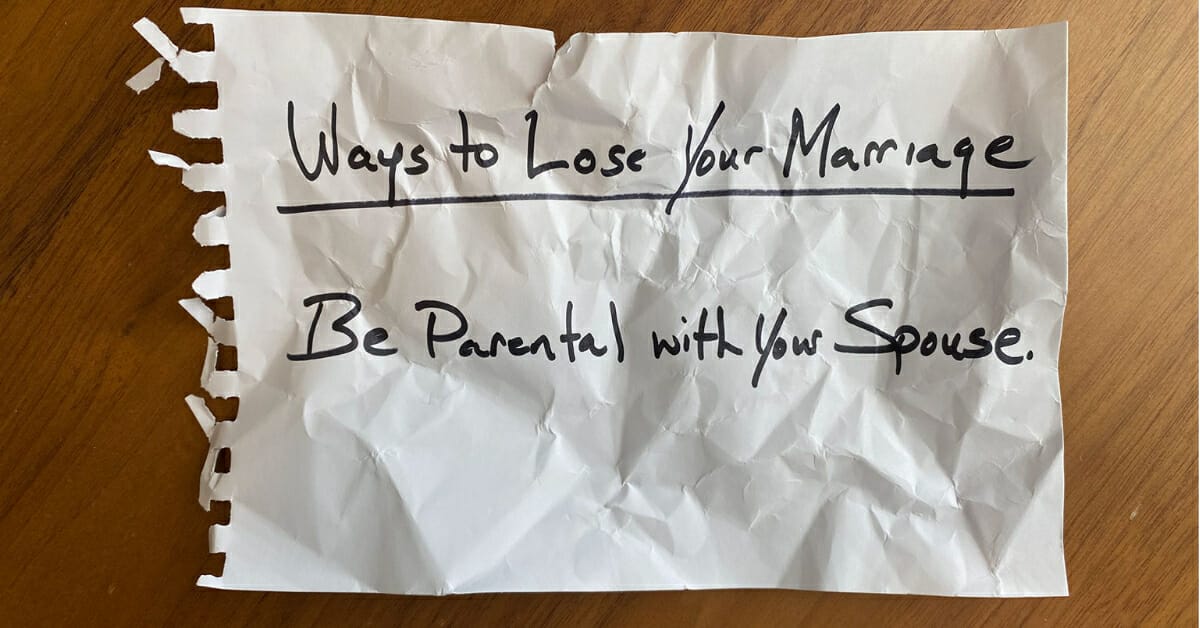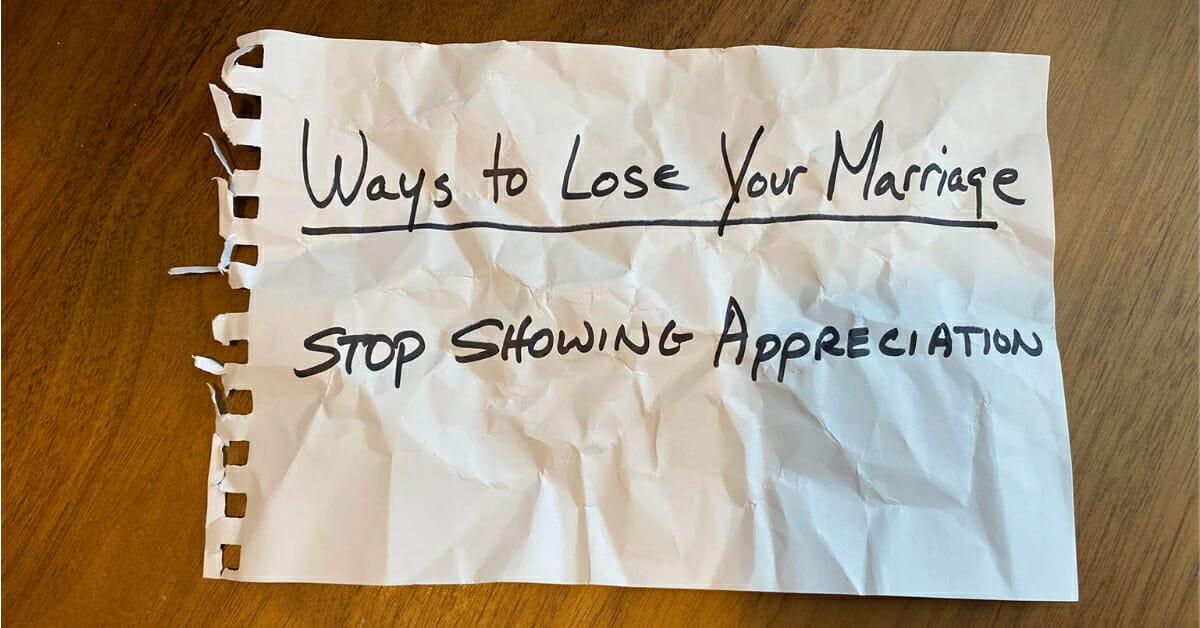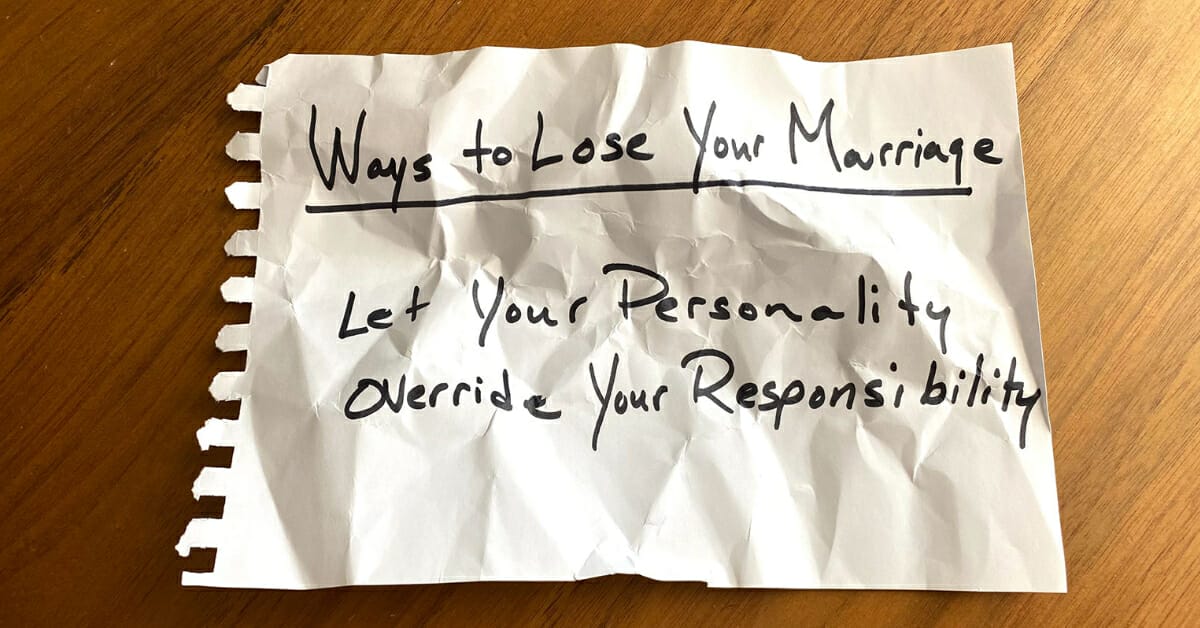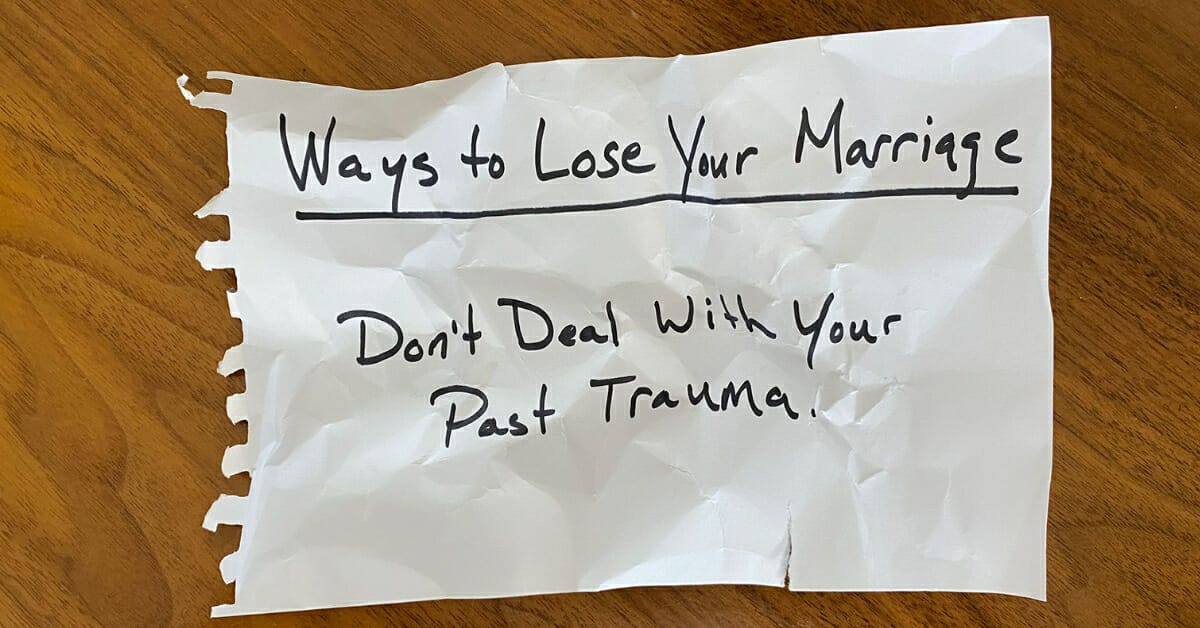Note: We are currently in a series called “The List.” The list refers to a list of ways you can lose your marriage and is based on information gleaned from over 20 years of counseling records and watching marriages fail.
DON’T TELL ME WHAT TO DO!
I was having dinner with one of my daughters and her children the other night when my daughter told her 7-year-old son to do something. My grandson responded by saying, “I’ll be glad when I’m an adult so I won’t have anyone telling me what to do or how to act!”
We all know that being an adult doesn’t spare you from being told what to do and how to act. It just removes your parents from that role and replaces them with bosses, landlords, the IRS, and yes…even spouses.
It’s a fact of life that spouses will occasionally tell one another what to do. When done kindly and respectfully, there’s usually no problem. But it becomes a threat to a marriage when one spouse is continually coming across as parental.
ARE YOU COMING ACROSS AS PARENTAL?
Most of us don’t know when we’re being parental. Even if our spouse had the courage to point it out, it’s hard for us to see it or accept it. The spouse who’s being parental just thinks they’re being helpful, loving, or efficient.
So, how can we know when we’ve crossed the line from just being helpful into being parental? Well, here are some things to look for:
- You equate your way with the “right” way.
- You hear yourself frequently using words like “you should,” “you shouldn’t,” and “you ought to.”.
- You give “suggestions” that are frequently interpreted as commands.
- You frequently correct your spouse.
- You are frustrated and take it personally when your spouse doesn’t take your “suggestion.”
- You feel their difference of opinion is disrespectful or rebellious.
- You frequently give directions or instructions.
- You complain about having to micro-manage things.
- You talk to your spouse as if they were one of your children.
- You feel it’s you’re job to ensure quality control.
- You find your spouse bristling or withdrawing when you’re “just trying to be helpful.”
- You often hear your spouse complain of your authoritative tone.
Being parental is not just about what you do, but it’s about how you do it and how often you do it.
WHY DOES THIS HAPPEN?
Being parental can happen for a number of reasons, but here are three of the biggies…
It’s what you witnessed growing up.
If you grew up in a home where one parent tended to “parent” the other, you could easily fall into the same pattern. After all, what we see growing up is usually the only model we have for how to do marriage. So being parental with your spouse just feels familiar and right.
You’ve been deeply hurt or traumatized.
Those who have been hurt or traumatized often try very hard to control things and people so as to not get hurt again. They may even do this so the people they love don’t get hurt. But their fears and insecurities don’t come across as loving. They come across as controlling and parental.
Your spouse is acting selfish or entitled.
It’s hard not to act parental when your spouse is acting selfish, demanding, or entitled. After all…if they’re going to act childish, then someone has to act like the parent, right? So it’s easy to fall into the parental role when this happens.
But be careful in assuming it’s your childish spouse’s fault. Perhaps you’re not acting parental because they’re acting childish. Perhaps they’re acting childish because you’re acting parental. (Let that sink in a minute.) And even if your spouse started it by acting childish, it won’t get better if you go parental on them. That will only make them act more like a child!
WHAT CAN YOU DO?
Whether you’re the spouse being parental or the spouse being parented, you can’t control how the other is acting. You can only control how you’re acting. So, no matter which role you’re playing, ask yourself the following questions…
Is there any truth to what they’re saying?
I know. Our immediate response to such a question is, “No. There’s no truth to what they’re saying.” But take my word for it. There’s always a kernel of truth in every criticism, and it’s our job to look for that kernel of truth and do something about it.
- If you’re the one being parented. Listen to what they’re saying; as hard as that may be. Maybe they’re telling you you’re not listening, or you conveniently forget what you’re told, or you’re not helping out enough, or you only want to do the things you want to do. Whatever it is, swallow your pride and ask yourself if there’s even a kernel of truth in that.
- If you’re the one being parental. Ask yourself if there is any truth to that. Are there times when you feel you have to treat them like a child? Are there times when you feel tired of correcting them? Are there times when you feel like if you don’t stay on them, things won’t get done…or they won’t get done right?
Would I want to be treated this way?
If you have trouble being objective enough to answer the first question, then maybe this question will help you get at things from another direction. Look at all the things that your spouse complains about and ask if you would like it if the shoe were on the other foot.
- If you’re the one being parented. Ask yourself if you would like it if your spouse…didn’t follow through on what they said they would do – didn’t do a very good job on something that was important to you – didn’t help you when you felt overwhelmed – did or said things that felt disrespectful.
- If you’re the one being parental. Ask yourself if you would like it if your spouse was…frequently correcting you – frequently telling you why their way was better than yours – acting like you’re the only person in the world that thinks the way you do – treating you like you couldn’t get by without them.
What’s one thing I could do differently that would help?
Yes, there’s probably more than one thing you could do, but start with the one thing you could do that would make the most difference.
- If you’re the one being parented. Think about the one thing that your spouse complains about the most with regards to your behavior and change that one thing. I realize that they may not think it’s enough of a change, but trust me. That little change will begin to make a difference.
- If you’re the one being parental. Think about the one thing that your spouse complains about the most with regards to your behavior and change that one thing. I realize that they may not think it’s enough of a change, but trust me. That little change will begin to make a difference.
Did you notice that the recommendation was exactly the same for the spouse who is being parented and the spouse that’s being parental? That’s because we both have the same responsibility…to act more like an adult and less like a parent or child.
A FINAL WORD…
It’s easy for both the spouse being parented and the spouse being parental to be confused by the other’s reactions and push-back.
The spouse that’s being parented feels like their spouse doesn’t love them or they wouldn’t treat them like a child. But the spouse being parented has focused on their freedom to the detriment of their responsibility. And the spouse that’s being parental feels like the only reason they would act this way is that they truly love their spouse. But they’ve confused love with control.
The parent-child relationship is a healthy part of raising a family, but not building a marriage. After all, no one feels romantically inclined towards their parent. Instead, they often want to get away from their parent. That’s why, whether you’re the one being parented or the one being parental, this is a sure step toward losing your marriage. And that’s why it’s on the list!








